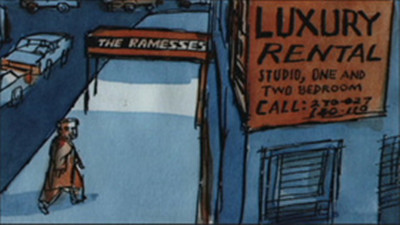I'm going to read a few strips.
我馬上會(huì)朗讀的一些連環(huán)漫畫。
These are, most of these are from a monthly page I do in and architecture and design magazine called Metropolis.
它們中的很多都選自我每月刊登在一本關(guān)于建筑設(shè)計(jì)雜志上的小故事。那本雜志叫《摩登都市》。
And the first story is called "The Faulty Switch."
第一個(gè)故事叫做《開關(guān)的小瑕疵》。
Another beautifully designed new building ruined by the sound of a common wall light switch.
又一個(gè)設(shè)計(jì)精良的新建筑被一個(gè)再平常不過的電燈開關(guān)的啟動(dòng)聲給毀了。
It's fine during the day when the main rooms are flooded with sunlight.
白天的時(shí)候一切都很美好,陽光灑滿了你的房間。

But at dusk everything changes.
但當(dāng)黃昏降臨一切都變了。
The architect spent hundreds of hours designing the burnished brass switchplates for his new office tower.
建筑師愿意花很多時(shí)間,為新的辦公大樓設(shè)計(jì)這些拋光的銅制開關(guān)板。
And then left it to a contractor to install these 79-cent switches behind them.
然后讓承包商在這些精致的開關(guān)板后裝上79美分的開關(guān)。
We know instinctively where to reach when we enter a dark room.
我們本能地知道,當(dāng)我們走進(jìn)這間黑屋子時(shí),該按哪里打開開關(guān)。
We automatically throw the little nub of plastic upward.
接著,我們就自然而然地把那小小的按鈕向上一摁。
But the sound we are greeted with,
但是,當(dāng)房間溢滿,
as the room is bathed in the simulated glow of late-afternoon light,
如傍晚陽光般昏暗的光線的時(shí)候,那迎接我們的一聲響。
recalls to mind a dirty men's room in the rear of a Greek coffee shop.
卻讓人想起了一間希臘咖啡店后面那不甚整潔的男洗手間。
This sound colors our first impression of any room;it can't be helped.
這聲響讓我們對(duì)任何一間房的印象都那樣先入為主,改都改不了。
But where does this sound,commonly described as a click, come from?
但是這我們稱之為“咯嗒”的聲響到底從何而來呢?











